#but I can still project my inner child onto that alien girl
Text
I’m so jealous of that little girl in S2E15 of TNG… I would’ve killed to be holding Data’s hand as a kid, wandering around on that set oughhhhh
My inner child is screaming yelling crying stomping their feet, swinging their little fists around in a whirlwind
#shut up ray#I would not have liked all the makeup and shit#but my inner child is stomping their feet and demanding I should be the one in her place#‘I wanna hold Mr Data’s hand >:( why does SHE get to do that’#then my dad would be like ‘oooooo you LIKE him?’#and I’d just go ‘what? dude I’m 5 are you crack?’#alas…. I was far too young when TNG was being filmed anyway…#so young in fact I hadn’t even been conceived when season 2 was being filmed#but I can still project my inner child onto that alien girl#ahem…. watching TNG as an adult brings out feelings in me#I would’ve also loved to meet Geordie…. -sigh-#and probably try on his visor… I don’t think I knew he had eyes under that thing
0 notes
Text
Uniquely Him – Xiao Zhan: The biggest monster to defeat is himself
Translator’s Note: This article comes from ELLE Magazine 2019 Jan Issue.
He learned drawing since elementary school, drawing planets and monsters were his obsession, firmly believing in the existence of aliens. As a lively, vivid and exemplary person, he radiates a sense of security from someone dependable, and yet he has a worldly wisdom of one who knows the ways of the world but prefers not to practice it.
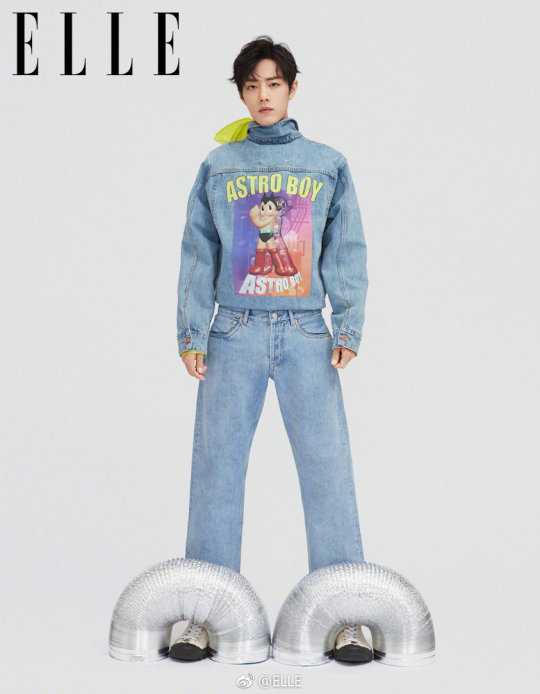
He learned drawing since young, drawing planets and monsters were his obsession. When he watched Martians in movies as a child, his wild imagination gave him a battle with monsters. At that time, he was a boy who was especially fascinated with space, and believed firmly that aliens existed. When he saw news on UFOs, he was excited, curious, but also afraid – would the aliens be friendly with us?
After he read “The Three-Body Problem”, this feeling grew stronger. While exclaiming the broadness of the author’s imagination and how grand the universe is, he researched on the theories and explanations in the novel, as well as on astronomy. Xiao Zhan also imagined how the subjects in “The Three-Body Problem” would look like, “looks like an engineer, perhaps he wears spectacles, he must have a highly progressed mind, great mechanical skills, but probably useless in everyday life, just like Sheldon in ‘The Big Bang Theory’.”
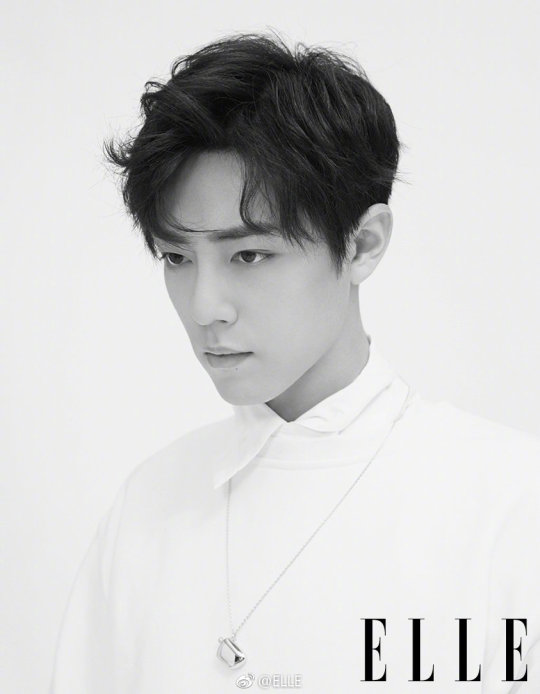
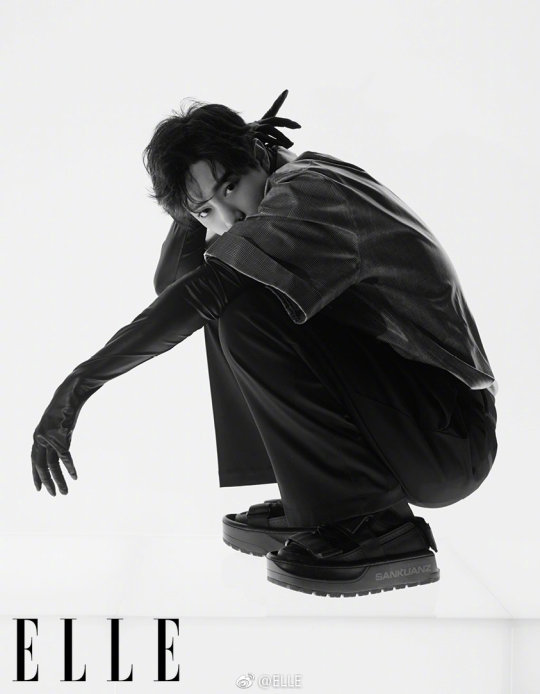
The cruel logic behind all the glitz
Seated in front of the window in the hotel room, his long narrow eyes, puffy and red, Xiao Zhan just finished a day’s filming, and was accepting our interview in a layer of thick winter coat. His attitude was polite, and all around him was the vividness of youth – this made a huge impression.
He had his own studio when he was in year 2 of university, and became a designer after graduating – exemplary student Xiao Zhan’s most glorious moment was being able to design logos in projects with his seniors while he was still an intern, and the client eventually chose his design. Life as a designer lasted until 2015 – his university teacher recommended him to participate in “X-Fire” (TN: A talent search variety show) and he debuted, and since then, his life went onto a different track, becoming one of the hottest idols currently.
Actually, the challenge of becoming an artist is not much different from fighting monsters – since you receive flowers and applause, you would also receive gossip and rumors. His life had been smooth sailing till this, and this confused him for a while, “When the competition ended, there was some dissenting voices, I didn’t quite understand then. Now I’m more at peace, because when you choose a career, you need to learn to accept it. People will like you, and there will be people who won’t.”
However, the cruel logic behind all the glitz was something he could not have imagined. “Audiences do not see what you’ve experienced along the way, they would only judge you based on the final results.” He was filming his first period movie, being outdoors in the mountains at -10°C+ was a daily norm, “We’re filming by the river, everyday we could see the ice slowly form up, today the river is totally frozen, we could walk on it. Basically after every scene I have to cover my face with a warm water bag, otherwise my face would be numb from the cold and become uncontrollable.” And because today there was a scene to scream and shout, Xiao Zhan’s voice was already hoarse.
Xiao Zhan could overcome all this suffering and exhaustion well, the biggest monster he wanted to fight were his self imposed restrictions. “Just now I was thinking while doing make-up, that actually celebrities are like a product, packaged by make-up and styles in order to polish this product. I will bring forth my best to my audiences, but yet I don’t want to over package myself, the real me needs to be in it. I wish that everyone, while accepting my glorious exterior as a celebrity, would also accept my flaws and quirks, since after all, I am a vivid person.”
This sincerity and clarity is where Xiao Zhan’s wisdom lies.
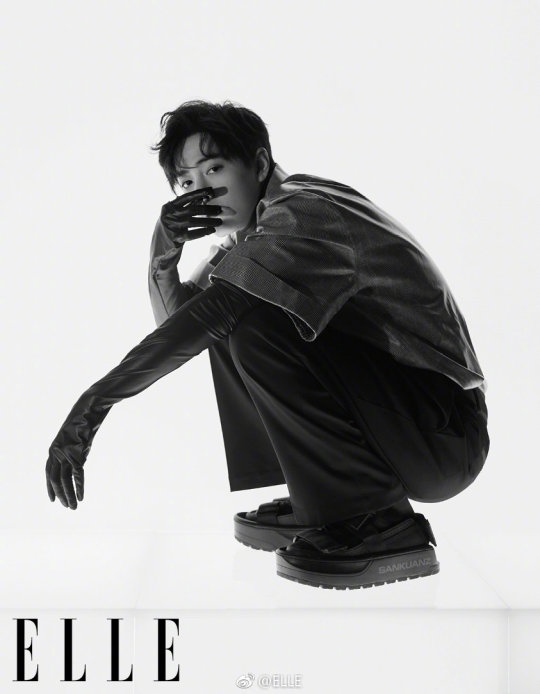

“There is no grandiose in my life”
2018 is the year of rapid growth for Xiao Zhan, he had main roles in various dramas, such as “The Wolf”, “Joy of Life”, “The Untamed”, etc – honing his acting and radiating his presence.
As the lead actor in “The Untamed”, Xiao Zhan’s load was heavy and his filming schedule was tight – filming under the ceaseless summer heat in Hengdian, his mind was always tense. The temperatures in the set was as high as 50°C, the make-up could not stay on, and he filmed most scenes barefaced. The most unforgettable scene was a crying scene – Wei Wuxian, portrayed by Xiao Zhan, had an explosive emotional scene after the massacre of the Jiang family. This scene started filming in the morning, he and Jiang Yanli started crying since 7 a.m. and after they were done, their eyes were as swollen as that of goldfishes. Before this, he was filming “The Wolf” – he systematically took performance classes and grew rapidly in during the filming. “Familiar set and environment, learning to adjust to the nerves and tension, especially since there were hundreds of people servicing you on set, you can do no mistakes.” Xiao Zhan radiates this sense of security from someone dependable. “The Wolf” was his first time as a main supporting role, and he was under tremendous pressure during that period, he often dreamed of acting on set. After every scene he would request for everyone to provide feedback, and then he would learn continuously, analyze and quickly adjust.
After that he had his first cat of his life, a munchkin named Jianguo (TN: Jianguo means nut). After the performance teacher learned about this, one of the homework he gave Xiao Zhan was for him to observe his cat. As a cat-lover, he reveled in the it, “I found out some things that I overlooked, like you will find out that when she’s angry, affectionate or hungry her expression and calls are different.” Xiao Zhan was exceptionally loving to his cat – the first thing he did when after a day’s work was to go home and play with his cat. His private life was quiet and simple, he just stays at home. “The feeling of staying at home is like falling into a cloud, you could roll around as you like, there is no pressure.”
“There is no grandiose in my life.” This was what he felt that gave people the sense of security. His parents, while supportive of his career, were also worried, hence Xiao Zhan often communicated with them, sharing his career successes, helping them be at ease.
In the whole conversation, Xiao Zhan had the purity and enthusiasm belonging uniquely to a youth, and there was this sense of extraordinary realness in him. “Whether or not I want to be an idol, I don’t actually have a choice, the label of an idol is already on me, just that I want to slowly shed off the label of an idol, and become an actor accepted by audiences, so that they can see more of my inner self.”
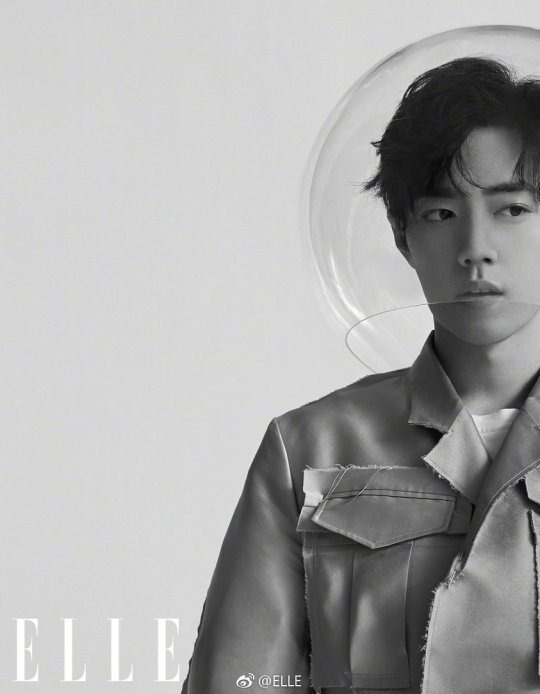
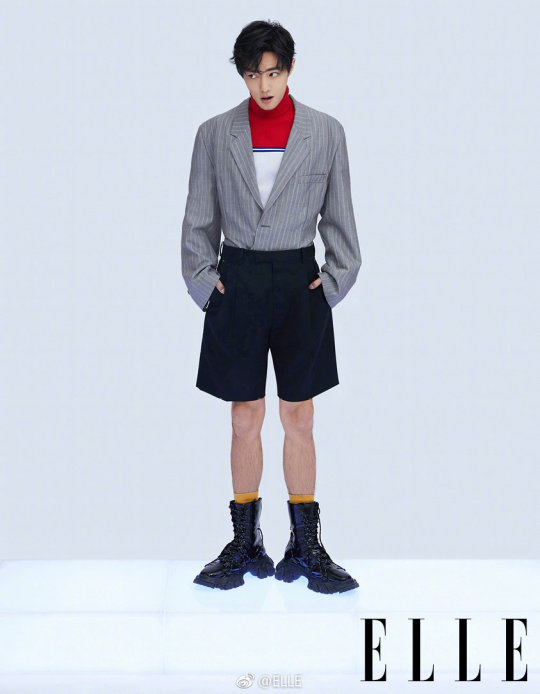
“I especially dislike public proclamations, you have to pace your life.”
ELLE: What type of boyfriend do you think you are?
XZ: I am the boyfriend who is more considerate of the other person, if there were to be my other half in the future, when she’s busy, upset or happy, or wants me to do something, I’ll try to accompany her the way she likes it.
ELLE: Are you the gentle puppy type of boyfriend?
XZ: There’s definitely a dominating side, but if you were to be dominating everyday, how do you live? When you have the other half, the most important things are responsibility and trust. (After having a cat, do you think you’re a good dad?) I feel yes, from taking care of my cat.
ELLE: What type of girls do you most want to date?
XZ: In many interviews before I spoke about warm, gentle and family-loving girls, but I feel that it still comes down to chemistry, and this is something unpredictable.
ELLE: If you are currently dating a girl, how would you hope to spend Valentine’s Day?
XZ: Stay at home, and cook together. There’s a phrase about when you love the right person, every day’s Valentine’s Day, why do you have to spend that day in the crowd with everyone. Being an artist is quite particular, and quite tiring, I have to go back to live my life. If everyday has to be vigorous and stirring, there’s no way to live. No one can act everyday, I especially dislike public proclamations, I feel that you have to pace your life.
ELLE: If we give you a holiday now, what would you do?
XZ: Go home and rest, with my parents, and then play with my cat.
ELLE: Are you a typical Libra?
XZ: I don’t think so, I don’t have difficulties in choosing, when I spot something I want to buy, I’ll just buy. But sometimes I’ll be stuck in things that I care about, for example the scene I did today, if I’m not satisfied with it, I will think about it from morning till night, and annoy the others around me with my nagging.
209 notes
·
View notes
Text
Sharp Objects
I’m three episodes into the HBO series SHARP OBJECTS at the moment. It’s a fascinating mystery with complex characters and a slow burn that keeps you intrigued. There’s one stand out element it really nails though: Someone who left a small town and returns. Small Midwestern towns are peculiar places. Twin peaks, while exaggerated in some ways, nails the the fish out of water feeling that comes with returning to a city that you never really fit in with in the first place.
Small towns can be isolating places growing up in them. You either never truly fit in with the tight knit population or you become so involved with the town that you never escape. They have a hold. I see this in many of the kids my age. They either can’t wait to leave or never want to. That has a strong impact on the way you’re brought up as a child. Small towns tend to have focused beliefs and interests and if your’s don’t line up with that of the population you can begin to feel alienated. Making it so that for those who do leave, they feel the need to radically change who they are. Just like a person who deals with depression, you can feel the need to reinvent yourself rather than learn from those hardships and grow. You internalize and double down. Small towns do the same, the incorporate that pain into their culture. It makes them who they are.
This isn’t an effort to vilify small towns, quite the opposite. It’s to acknowledge the problems of internalizing past pain and projecting it onto yourself, rendering yourself unable to move on.
Amy Adams plays Camille, a reporter from St. Louis who’s returned her hometown of Wind Gap to investigate the murder of a teenage girl. Upon return she's immediately hit with memories that trigger a tremendous amount of anxiety within her. She’s the daughter of the town Matriarch who’s heavily involved in the inner workings of the town. The mother and daughter have a tense relationship as Camille has all but turned her back on the town and her family following the death of her sister. This is where we get our first look at how people internalize pain. Adora, Camille's mother has withdrawn herself. Becoming obsessively protective and closed off to the outside world. She’s had another daughter since the death of her daughter, Marian. She’s not just involved herself in the town, she’s become the town. A trap for pain that doesn’t let it escape, but still lives in fear of it. Camille has processed her pain by leaving and trying to forget the past.
Camille left Wind Gap, turned to alcoholism in an attempt to blind herself from the past. She’s trying to numb herself, but there’s a difference between numbing and coping. As a crime reporter, she’s taken others pain upon herself as a way to be able to feel that pain for herself but to have the focus elsewhere, but coming back to Wind Gap, that isn’t an option anymore. She must face herself and her mother.
The two immediately clash. Adora hates Camille digging into the case of these murders. It’s unfair to those grieving and in poor taste, but this is how small towns work. It’s fear of emotional progress, because that kind of growth means change. Small towns don’t want to change, they want to stick to their idealized golden time. This ideal prevents self understanding. It doesn’t allow you to see the good times and the bad times as equally important, formative experiences, but rather it puts the blinders on. You either stick in the town and try to shut out anything that disagrees with you, or leave and try to numb yourself to the past.
Sharp Object has been a good, but pretty difficult to watch. As a person who grew up in a tiny Midwestern town and is back over the summer break from college, I feel a lot of the claustrophobia and anxiety of coming back to a place and not having a particularly good past experience in, but it’s also a growing experience. I’m excited to watch more, and since I’ve never read the book it’s got me hooked.
3 notes
·
View notes
Text
The Third Space
From the inner workings of a half Korean, half white, Jewish, straight, cis woman:
My perceived alienation as a child prevents me from understanding how others actually view me. I remember my childhood, transitioning into adolescence, or that period in my life where I started to become acutely aware of and deeply uncomfortable in my body as a body, characterized by turmoil, the desire to rip off the pouches of skin that hung over the waistband of my pants, to shrink my nose, to enlarge my eyes.
My body felt alien from the bodies I was surrounded by on a day to day basis, this internalized alienation purporting a sense of otherness and placelessness. I strove to act like, talk like, mimic the bodies of the white girls, hoping that embodying their characteristics could somehow transform my own body.
I strove to shrink, to be petite, and demure, and delicate, like how Asian girls are supposed to be.
Supposed to be.
I don’t know if anyone who looks at me gives me much thought. I had always assumed that people were meticulously trying to decipher me, break me down into categorizable boxes for their own comprehension, scrutinizing my face and hair and body.
“Are you….
Chinese? Thai? Native American? Italian? Mexican? Hispanic? Japanese? Indian?
Are you sure?”
Yup. Pretty sure, at least more sure than you should be.
I thought that these assumptions, however ignorant, were deliberately thought out, and that their ignorance was an indicator of deeply rooted misunderstandings and misconceptions of race, and what certain people are supposed to look like.
What I think I know now is that people don’t actually think these things through as meticulously as I had thought, or hoped?
People don’t really analyze my separate parts distinctly. They take a snapshot, a baseline assumption, that grossly neglects my ambiguity in appearance and they trust that they’re right, if only in the fact that I’m something different, unidentifiable, mixed.
I don’t mean to project malicious intent onto these people. They see me and they believe that they are trying to understand, they believe that they are stretching themselves and testing their empathy and political correctness and cultural competency. They truly think they are paying homage to what I represent–the “melting pot,” the “future,” the trend of ethnically ambiguous as beautiful, so long as it has some semblance of white.
The future is—-not white, not black, but not so brown that whiteness is unidentifiable.
White people would like to believe that they are a part of this future of racial harmony, of cultural sharing, of changing conventional norms of beauty. They would like to believe that they would be okay with a brown world–but they only are if they see themselves in it too.
Which is why when white people (white boys) tell me that I am beautiful, I am validated through their belief that I am different enough from them to be special, exotic, worthy of their time and attention and love.
And over time, I am equally shook by their inability to comprehend and value difference should it be too different from them–you see, I’m different, but I’m not so different that they have to actually stretch their cultural empathy. I am white enough, and have been socialized in whiteness to such an extent, that they are comfortable loving me, because I validate their self-image of empathy and cultural competency while still existing in their white world with relative ease.
Is this the third space?
_________________________________________________________________
The third space.
I have spent my entire life trying to place myself into one of two spaces, denying integral parts of my being in order to squash myself between the borders of a box I so desperately want to fit into. And it’s not necessarily that those members of those communities–those who fit in the box comfortably, noticeably, whose label comfortably encompasses their being–actively wish to expel me, exclude me from the box. It’s 2017. The idea of my parents, an Asian woman and a white man, living happily together with two healthy children, is not revolutionary, or unheard of, or something that disgusts most “progressively minded” people in the communities I am a part of. My existence, when explicitly expressed to white people and Asian people, is not horrific to them–in another time, maybe, I would be seen as an impure sub-human specimen, but I am lucky enough to exist now, where my existence validates people’s best intentions and hopes for the future. My existence proves to them that love is powerful enough to overcome difference. My existence validates their belief that friendship is colorblind. My existence gives them hope that the future of racial harmony can be attained through the sole means of their love for people of other races, because isn’t it that love that created me? I am a symbol of the beautiful multiculturalism of our expanding world, of the normative and ignorant vision that white people see themselves as pioneers of racial equality simply because they can fuck and grow a family with someone darker–but not too much darker–than them.
So it’s not white hostility that denies me access to their box, and I say white hostility and neglect to say Asian hostility because of my socialization into whiteness as a child–I lacked access to a Korean community, due to the demographics of my school, my neighborhood, and my inability to speak the language. White hostility did not deny me access to the box, but rather my own internalized alienation and inability to fully connect to the experience of white people–of feeling accepted, represented, and reflected positively in every aspect of the world–that did. My Asianness was an illusory cloak I shielded myself with as I shrunk from whiteness. My inability to be socialized into Asianness due to my lack of access to an accepting Korean community, or even to representations of Korean people in what I perceived of as my “world” of East Coast suburbia in a traditional WASP enclave, meant that I had to construct a semblance of an Asian identity from the fragments of knowledge I collected through visits to my grandparents, where we ate traditional Korean food, and Maama delightedly tried to teach me Hangul after I told her I wanted to learn how to speak Korean, the afternoons spent going over unfamiliar symbols that apparently were letters with sounds attached, but to me felt as distant as the Korean identity I was trying so hard to obtain for my self-validation.
Hangul never really stuck with me. I was young, and despite my yearning to fit within the Korean box, the impatient and stubborn nature of my youth led to reluctant practice and eventual desertion of the conquest of the Korean language.
My Asian identity was a self-constructed, crumbling formation, like a house haphazardly nailed together into some semblance of a roof and walls, not even house-like enough to be considered a home but so deliberately erected that one had to admire the effort. Not enough of a home that one could comfortably reside within its walls, and say with confidence, this is my home, here I shall stay.
My whiteness was a construct built against my will, out of my control, by the white people I surrounded myself with every day. It beckoned me to come through, to make myself at home, begging me to reside comfortably within, and yet when I approached the door, ready to become absorbed into the realm of normalcy, I tripped. Come in, it said, but as much as a tried, I could not get past the entrance. I put my foot in the door, and felt vulnerable, exposed, alien.
You belong here, we love you.
But underneath the proclamation of love was the visceral sense of being stared at, watched, observed as a symbol of what love should be. We love you, come in, but that love is only the selfish love of one’s own sense of their empathy, their scope of human compassion, we love you because you are different but still one of us, we love you because you look like what we imagine is the manifestation of our acceptance, love, world peace.
And you shall love us too.
#mixed#biracial#multiracial#asian#east asian#jewish#white#fetishization#identity erasure#internalized racism#submission#writing#long post
100 notes
·
View notes